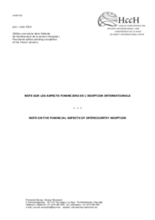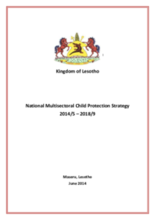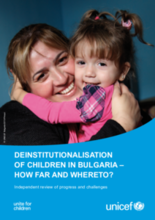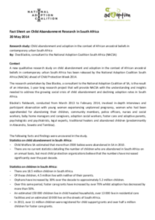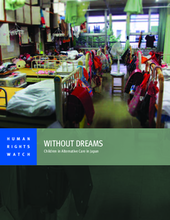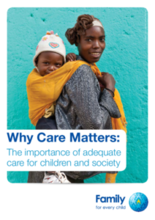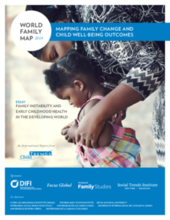Displaying 1121 - 1130 of 1798
To address the issues related to the financial aspects of intercountry adoptions, the Hague Convention initiated an Experts’ Group, which met in October 2012 and produced nine Conclusions and Recommendations, which they brought to the Permanent Bureau to publish as a “Note”.
This Multisectoral National Strategy for Child Protection builds on a mapping and assessment of Lesotho’s current child protection system, which drew together many stakeholders to consider how best to move forward on child protection in
This Review, commissioned by UNICEF Bulgaria, is aimed at informing the recommendations for the Bulgarian Government’s Action Plan for the implementation of the National Strategy ‘Vision for Deinstitutionalisation of Children in Bulgaria.’
This presentation by Mary Daly, a professor in the Department of Social Policy and Intervention at the University of Oxford, was given at Innocenti’s Expert Consultation on Family and Parenting Support on 26-27 May 2014.
This presentation from Innocenti’s Expert Consultation on Family and Parenting Support describes the development of parenting support policy in Croatia.
This fact sheet summarizes a qualitative research study conducted by the National Adoption Coalition South Africa (NACSA) that explored child abandonment and adoption in the context of African ancestral beliefs in urban South Africa. The goal of this one-year study was to better understand the growing practice of child abandonment and declining adoption rates in South Africa.
This country care review includes the care related Concluding Observations adopted by the Committee on the Rights of Persons with Disabilities as part of its examination of the first periodic report of Azerbaijan under Convention on the Rights of Persons with Disabilities at its 125th and 126th meetings, held on 1 and 2 April 2014, respectively.
This report by Human Rights Watch examines Japan’s alternative care system for children. It describes its organization and processes, presents current data on the use of different forms of alternative care and highlights the problems found in the institutionalization of most children (including infants), as well as abuses that take place in the system.
This report highlights the needs of children without adequate family care, the impact inadequate care on children and society, and why family care is important. In this report, Family for Every Child also issues several recommendations for those in all sectors of society and an example of care reform from Brazil.
The second annual edition of the World Family Map investigates how family characteristics affect children’s healthy development around the globe and includes a new essay focusing on union stability and early childhood health in developing countries.

